Most articles about slow learners are written about young children for their parents. But we can (and should) study throughout our lifetime! Mastering new knowledge and skills broadens our horizons, makes us more intelligent, and benefits our mental health.
Disclaimer:
This article is not about learning disabilities or cognitive impairment. For those looking for information in that respect, please check another article on the topic.
Instead, the article you’re reading now is for those who:
- Need help retaining information
- Take long hours to learn something their peers memorize in 20 minutes
- Have never had serious trouble with their studies but now face some difficulties
- Constantly doubt themselves and postpone chasing their dreams
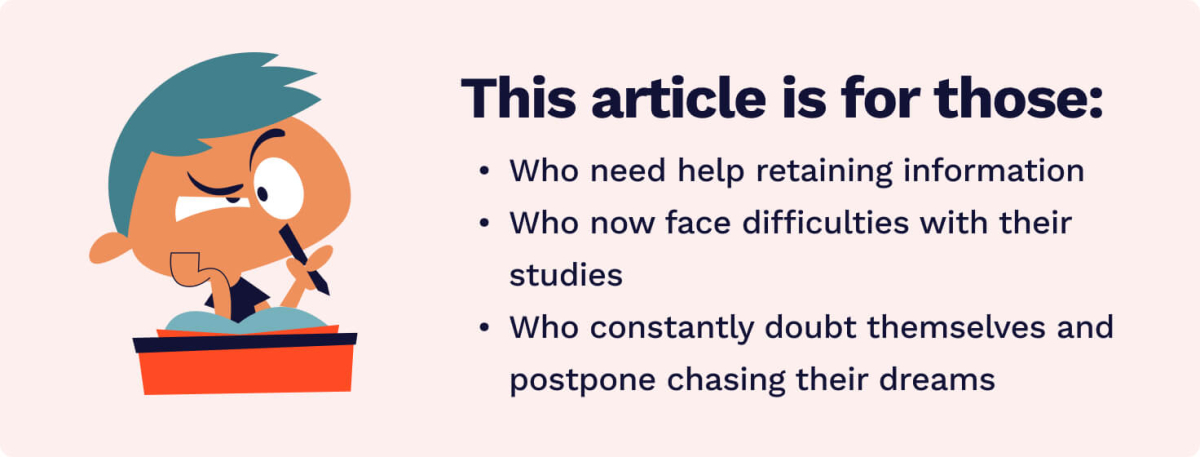
We sympathize with you, struggling learners, and hope you will find answers to all your questions here, including why you started having trouble with learning, what scholars say about your problems, and how you can resolve them.
😰 Struggling Learners: Who They Are & Aren’t
As mentioned above, struggling learners don’t have physiological features that cause their academic hardships.
They are different from people with:
- Learning disabilities – an “umbrella” medical term defining disorders in basic physiological processes involved in speech production and perception (e.g., dyslexia, dyscalculia, dysgraphia, etc.).
- Cognitive impairment – symptoms impairing one’s memory or problem-solving abilities (can be inborn or acquired with age).
- ADHD – also known as attention deficit hyperactivity disorder, a syndrome that impairs the ability to concentrate on one task.
- Other physiological conditions (impaired eyesight or hearing).
All these disorders and conditions require medical consultations.
Instead, we address neurotypical people with temporary struggles.
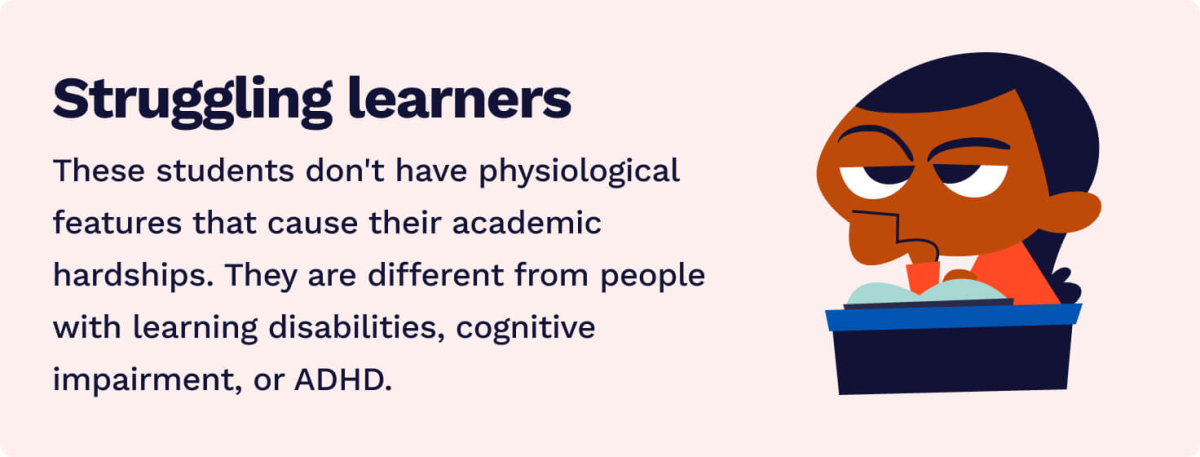
In particular, these struggles may result from:
- Chronic stress of any origin.
- A family or social situation that interferes with one’s ability to focus on studies.
- A learning context, topic, or subject that brings a student to a deadlock.
These factors are external and manageable compared to the learning disabilities mentioned above. With additional support, such students can escape the vicious cycle and become motivated learners.
🔬 What Do Scholars Say About Factors That Affect Learning Outcomes?
The good news is that scientists have a lot to say about factors that make us successful or frustrated learners.
In fact:
They suggest several causes that can determine why we struggle with learning. However, they don’t know for sure which cause is the most decisive.
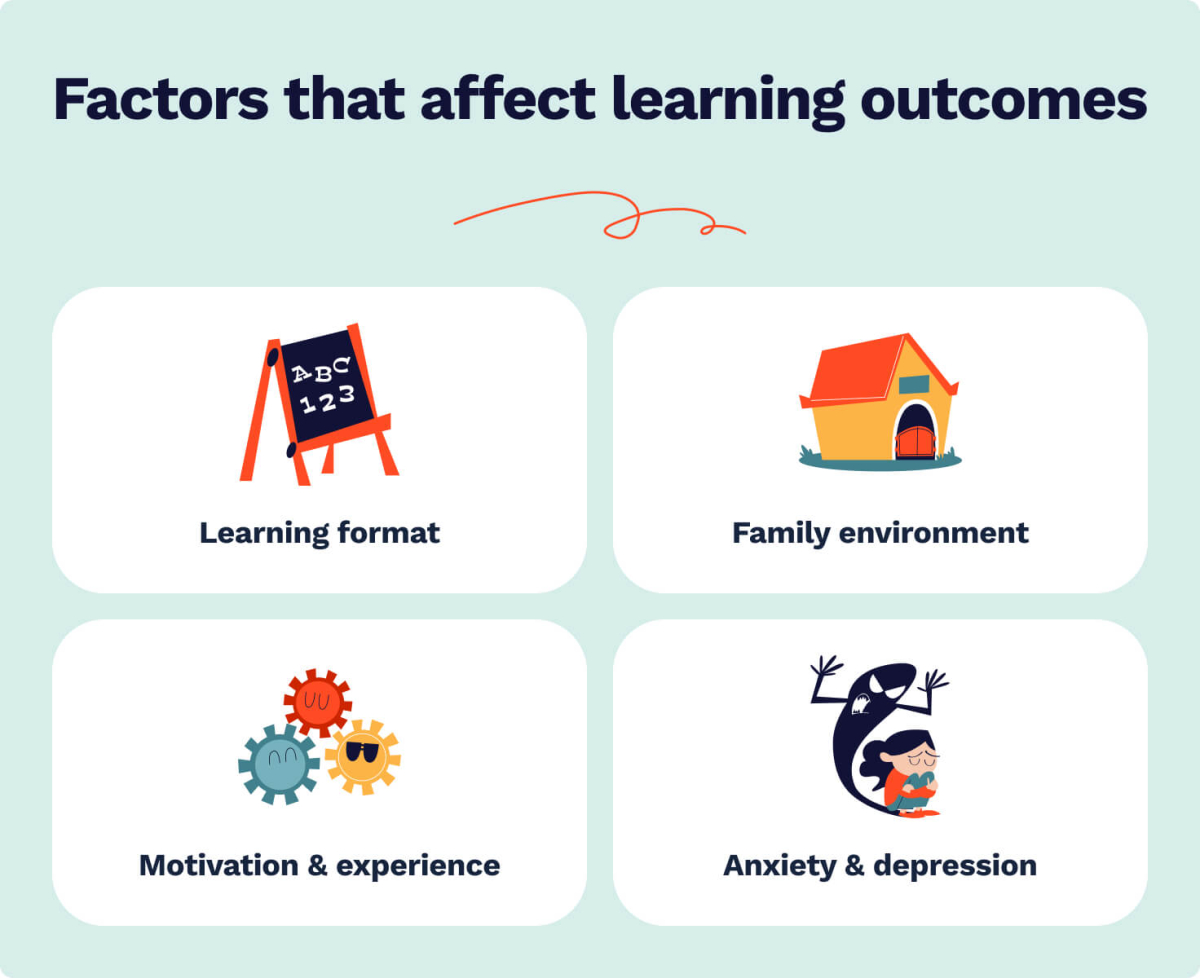
Learning Format
Each country has its own system of education (and expectations for students).
Therefore:
If you have spent a part of your life in one country before moving to another one, you are likely to struggle during the first years of school in the new country.
Secondly:
Researchers point out that some educational systems are more efficient than others. Lack of diversity and tolerance in a particular country can hinder the learning process of various minorities.
Finally:
The system you are in can be the wrong one for your learning style or personal preferences. If this is the case, changing your educational institution or at least your specialization can change your experience for the better.
Family Environment
Elevated stress levels, poverty, and domestic violence consume a child’s mental and emotional resources. Negative experiences leave scarce crumbs of attention for the learning process.
Unfortunately, you cannot do much about this as a child.
However:
As an adult, once you have identified the source of the problem, you can work it through with a psychotherapist.
Motivation and Experience
Researchers have confirmed that motivation is critical for your academic success.
For example:
Once you feel like doing something, you start engaging in that activity more often and eventually become good at it.
But what about the learning experience?
This can surprise you, but the more you study, the better student you become. Polyglots claim that every next language is easier to learn.
Why?
Because people develop learning habits or tips and tricks for processing and memorizing information. So, if the learning experience is your problem, you just need time, persistence, and motivation.
Anxiety & Depression
It’s important to remember that anxiety and depression can make you feel helpless and ineffective in all aspects of life, not just in class.
A study on educational outcomes in depressive patients vastly confirms the statement. In other words, depression is a motivation-killer. Anxiety, in turn, is a continuous source of unbearable stress (similar to an abusive family environment, with the only difference being that there is no abuse, just its emotional result).
You will have to combat these psychological conditions if you wish to remove any learning difficulties.
👿 8 Reasons Why You Might Be Struggling to Learn
From this section, you will learn 8 practical reasons for declining academic performance and motivation. If one or more of the reasons relates to your life, they might cause your struggles.
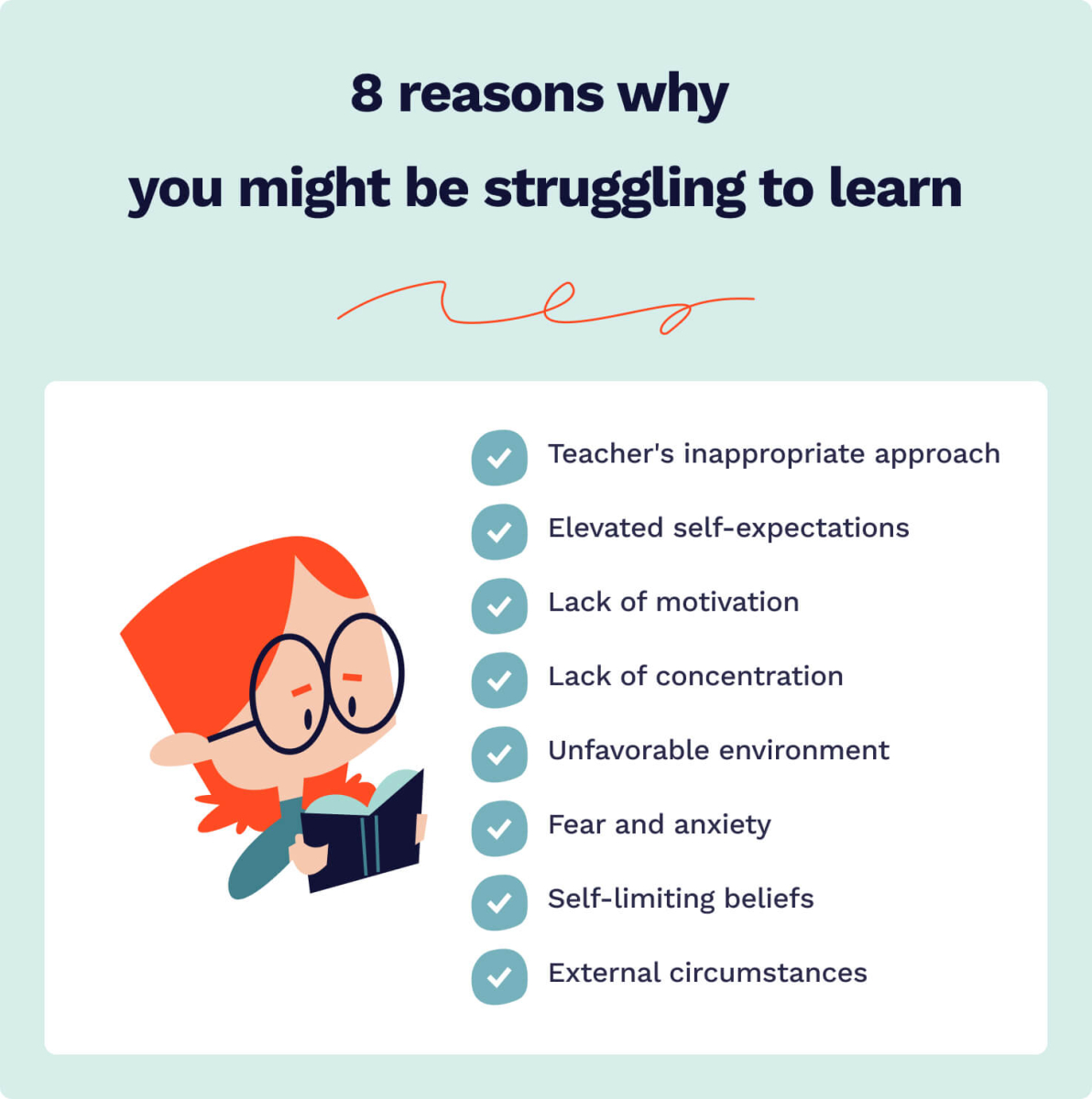
1. Teacher’s Inappropriate Approach
The concept of learning styles is unconfirmed. However, we do know that problems are created when teachers are indiscriminate in their approach to different students.
If you struggle with written texts but excel at hands-on practice, you should find another way of introducing new facts into your brain. Thus, even with the wrong teacher, you’ll still have a chance to do homework at your own pace.
2. Elevated Self-expectations
Very few people excel at everything. Most people are good at some things and not so good at others.
The healthiest thing to do is:
To identify the important disciplines for your preferred career and focus on those. We don’t mean you should give up all the rest of your classes, but a strong B in non-essential subjects is often more than enough.
3. Lack of Motivation
This paragraph deserves a separate article, but here is a short list of the main demotivating factors:
- No clear goals (why do something if you don’t know where you’re headed).
- Burnout (you need some time off).
- Boredom (maybe you’ve chosen the wrong specialization).
- Stress (see the paragraph about external circumstances).
- Depressive conditions (consult your psychologist or at least take an online test).
4. Lack of Concentration
If you can barely concentrate on the task for more than 15 minutes, you may have issues with:
5. Unfavorable Learning Environment
Life in a dorm is often overwhelming for introverted individuals. If so, you could study at the library or park.
By the way:
Many great thinkers of the past used to do the same thing to get rid of annoying distractions.
6. Fear and Anxiety
This paragraph is related to the previous one. Sometimes, an unfavorable learning environment can involve being afraid of your teacher.
Still:
We think anxiety deserves a category of its own because of its impact on students’ academic performance. Overly strict instructors can cause mental paralysis in their students. Do you remember when you could not speak up in class because you were afraid of giving the wrong answer?
Talk to the school psychologist about your problem. Together, you will figure a way out.
7. Self-limiting Beliefs
Our parents have taught us many essential things about household economy, love, and affection.
But:
Some of them have also transferred their helpless thoughts to the next generation. If you consider yourself too slow, indecisive, or stupid, then you have probably inherited your parents’ negative beliefs. Remember, you are limited only by your self-expectations.
8. External Circumstances
We can all have problems.
In fact:
Life is a constant process of dealing with one issue after another, although we prefer not to notice this.
However, while some of these are manageable challenges, others can undermine our ability to think clearly. The death of a close person, severe loss of property, or a failed love story can send us quickly into depression. If that’s the issue, learn about the five stages of grief and know that acceptance comes with time.
📘 12 Tips to Learn Faster & More Effectively
We already know the diverse causes of why adolescents and adults struggle with learning. Now, we’ll suggest brief recommendations for resolving them. It is time to make your education fast and efficient!

1. Know Your Learning Preferences
Many believe the term “learning styles” has become outdated, at least in the meaning of something fixed that defines your academic and professional success.
However:
Learning preferences do exist and influence our learning habits.
The most comprehensive theory of learning styles was developed by David Kolb. He was even better known for his “learning cycles” theory, which states that we all go through the four stages of learning:
- Active experimentation
- Concrete experience
- Reflective observation
- Abstract conceptualization
It is important to know that your learning style defines t
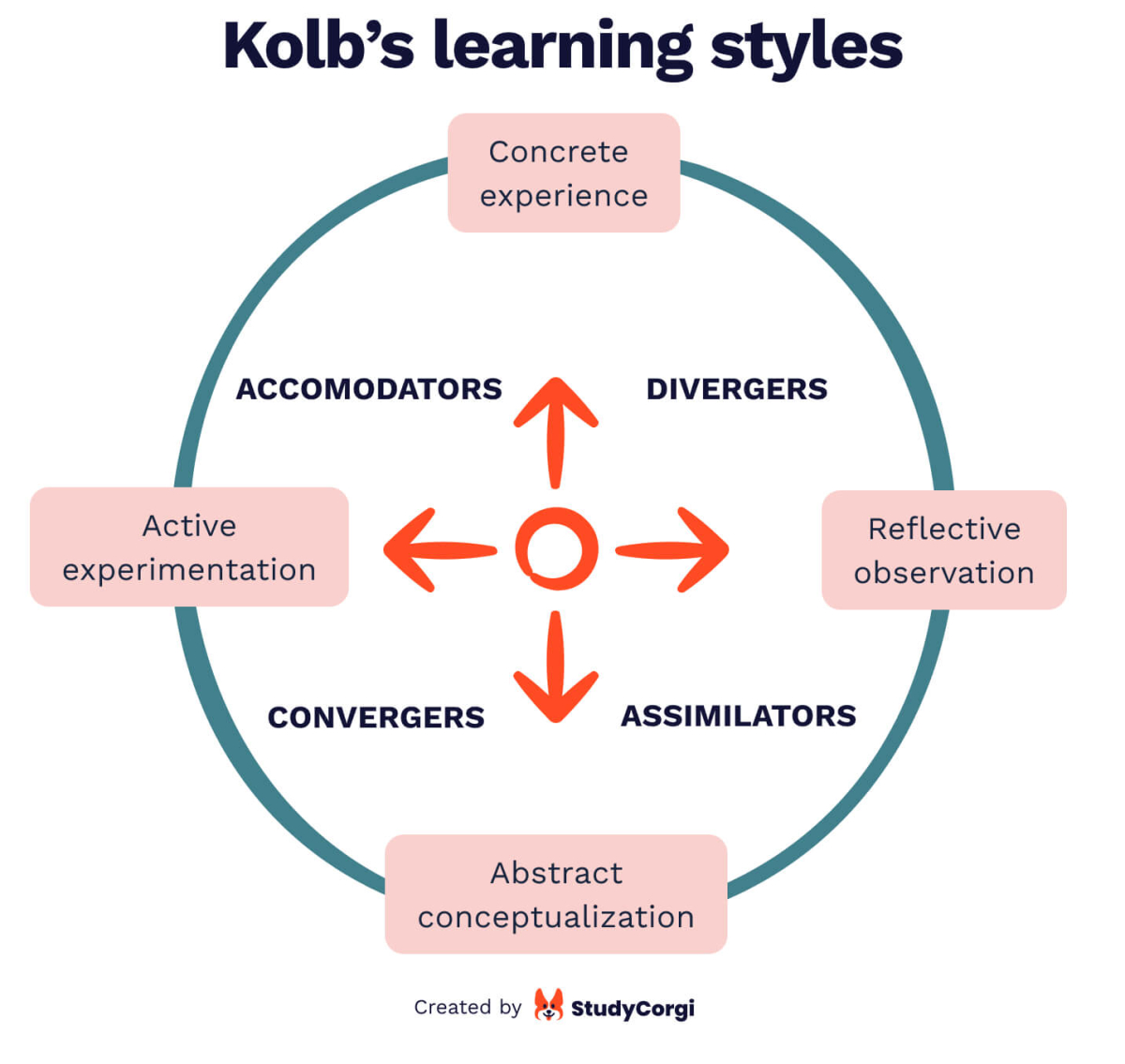
According to Kolb’s research, all people can be divided into four categories:
- Divergers prefer group discussions, brainstorming sessions, and peer-to-peer work.
- Assimilators like lectures and independent work.
- Accommodators excel at simulated environments and real-life experiments.
- Convergers prefer case studies, problem-based learning, and practical tasks.
As you can see, the traditional lecture format suits assimilators but not the three other categories of learners. As a result, many people struggle with their studies and don’t know why.
2. Think of Your Strengths
In addition to learning preferences, most people are intrinsically better at specific disciplines. We’re sure you know several Math geeks who hate humanities and other eloquent literature lovers who hate Math.
But imagine a gifted mathematician wasting a lifetime lamenting their inability to become a prominent writer.
We’re not trying to convince you that you can avoid all troubles.
But:
You should know your strengths and build your experience on them.
To do so, you need to:
3. Experiment with Memorization Strategies
Difficulty memorizing information is the most frequent problem of struggling learners. Here are several UNC-recommended methods to improve memory and facilitate learning.
Link It
Have you ever thought about why you struggle with memorizing new information? Our brains have to build neural connections to remember something. Imagine a route from your dorm to college. When you walked it for the first time, you looked at the map and even asked passersby for directions. But now you can cover the same route without thinking. Those neural connections have been well formed and will stay with you for years.
Being mindful of this fact, you can accelerate memorizing new data.
For example:
If you need to learn that George Washington was elected president in 1789, that’s a new fact for your brain. However, you already know that the French Revolution also started in 1789. If you link these two facts together, both will become more memorable. What a great benefit!
Sleep on It
The brain never rests. Even when you sleep, it keeps processing information and listening to what is happening around it. That’s why you should always review the information you want to memorize right before going to bed. Your brain will do the rest.
Quiz Yourself
The more you recall the information, the deeper the imprint it makes on your memory. Needless to say, we have a lot of downtime while traveling or doing domestic chores.
Take advantage of this time by actively recalling what you have learned. Make a mental note of the facts you cannot remember and practice recalling them during your free time.
Try Mnemonics
Mnemonics are tricks to make our brain memorize something new. Review the “Link It” section to learn about one mnemonics technique, and read on to find out about many more:
- Rhyme the word you are trying to remember with another word.
- Arrange the notes to have a visual picture of what goes where.
- Use acronyms – they are good for memorizing several words linked by an abstract concept.
- Chunk the long list into smaller manageable parts to memorize them.
4. Look for a Company
Do you remember how easy it was to make friends with someone when you were a child?
- Let’s be friends!
- Okay, let’s play then.
So, what happened here? You invited someone to a common activity, which was playing together.
Now, you are an adult or almost an adult, and finding a joint activity that will engage both of you is much more complicated.
Unless…
You are a student! Doing homework together is a powerful way to build mutual rapport and find a friendship that lasts beyond college years.
Here are more benefits:
- You will enjoy your studies more, and, therefore, you will be eager to dedicate more time to them.
- When one of you loses motivation, the other one can lend a helping hand and share their enthusiasm.
- You can brainstorm self-test questions more effectively.
- You can split monotonous and mechanic study tasks to save time for creativity.
- You can learn from each other.
5. Learn to Concentrate
Concentration is a muscle. The more you use it, the stronger it becomes. Some tips to consider here are listed below:
- Don’t spread yourself thin; work hard for short periods of time.
All of us have had those lengthy essay-writing days. You waste 15 hours trying to produce some 300 words. You look for the right way to say something and then lose your trail of thought. Instead, try writing (learning, memorizing, or calculating) as much as possible during a limited time. Editing takes less time than fighting procrastination. - Reward yourself during breaks.
You’ve worked hard for 25 minutes (we still insist on using the Pomodoro timers). Don’t use the break for cleaning up or washing dishes. That’s the time you’ve earned to rest. - Put away your phone; the farther away, the better.
Our phones are concentration destruction machines. They give us the feeling of connectedness to the community, but in fact, it is quite the opposite. Challenge yourself to limit your screen time to the essential minimum, and you’ll be surprised how much time frees up. - Diversify your activities.
You can trick your brain by swapping the type of activity you participate in every 25 minutes. It will feel like you are resting, even though you are still getting things done. But don’t do that too much or too often to avoid burnout.
6. Stay Productive in a Noisy Environment
Dorm life is often one big mess. Lots of people are always around, leaving you no chance to concentrate.
Here’s what can be done:
7. Change Your Locations
Diversity is the spice of life. Furthermore, research confirms we have context-dependent memory.
In other words:
We link studied facts with the environment in which we learn them.
Thus, you should shuffle your favorite study spots to keep your mind fresh and to avoid being dependent on context to remember important content.
8. Take Days off
We are not robots that work hard seven days per week. If you daydream with a book on your lap more often than reasonably healthy, you are probably approaching burnout.
The recommendation here is this:
Study hard – party hard.
At least take a day off to meet people you like and do something unproductive like taking a walk or meeting an old friend. You’re not wasting time. Instead, you are saving yourself from future procrastination.
9. Stay Motivated
Highly motivated people are not equally motivated all the time. During motivation downtime, we need a stimulus to keep on going:
- Praise your efforts, not results.
- Avoid too much external motivation, as nothing lasts forever.
- Look for internal motivation. Why do you want to learn this material?
- Review your progress and set further milestones.
- Realistic goals are a must.
10. Take Care of Yourself
The 3 big elements that support your success in your studies are:
- Sleep
- Food
- Sport
Sufficient sleep keeps you motivated and productive. Believe it or not, our mood mostly depends on how we slept the last night. That’s why we don’t recommend using your rest time for studies, as you will end up feeling lethargic and having a low decision-making capacity.
Similar to sleep quality, the food we eat impacts our learning abilities. Synaptic plasticity and energy metabolism strongly depend on how diverse and nutritious the food we eat is. For instance, eating fish frequently makes you less prone to depressive conditions and thus more motivated.
Some believe that sport is not for everyone. But if you don’t like any sport, you haven’t found the type of exercise that works for you. In any case, physical activity boosts your teamwork skills and leadership qualities. It also accelerates blood flow to your brain, feeding it with oxygen faster than usual.
11. Try Affirmations
I am smart. I can become a prominent physician. I know how to make a good presentation.
Do these sentences sound funny? Scientists believe they work!
Affirmations offer an excellent way to eliminate the helpless thoughts of being incapable of something.
Why so?
The brain forms new neural pathways by repeating these positive phrases, creating physical connections to these repeated affirmations. Eventually, they will lead you to positive emotional and mental outcomes.
Here’s a couple of recommendations to make the most of affirmations:
- Get yourself comfortable in a quiet place where nobody will overhear you.
- Identify your goals, desires, and values.
- Phrase them in a brief and precise form.
- Make them realistic and realizable within the foreseeable future.
- Notice when you are self-sabotaging and stop yourself.
- Be consistent and repeat your affirmations every day.
12. Be Kind to Yourself
Treating yourself with kindness improves your overall well-being. Meanwhile, it also lowers your depression and anxiety. Because no matter how productive you are and how much mnemonics you employ, if your brain is overwhelmed, it won’t work.
Changing the subject of your thoughts can improve your life considerably. Please share your thoughts on whether you’ve managed to improve your academic results by better self-organization. If something works for you, it will most likely help someone else, too.
